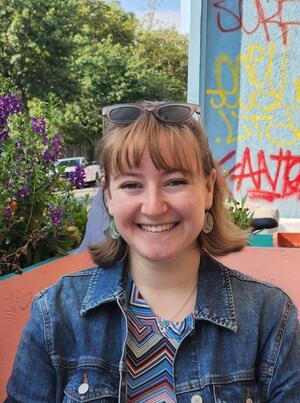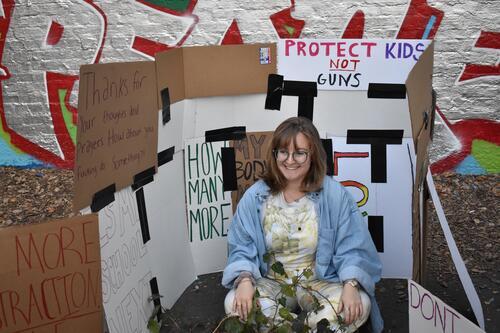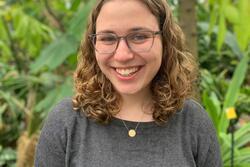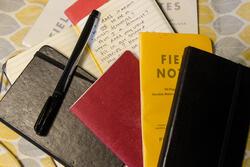Where Are They Now? RVF Alum Ilana Goldberg
As part of our ongoing series to mark the 10th anniversary of the Jewish Women’s Archive’s Rising Voices Fellowship (RVF), JWA talks to RVF alum Ilana Goldberg, who participated in the program’s second cohort. Ilana is now the program manager at Jewish Youth for Community Action in the Bay Area.
JWA: Tell us about your experience participating in the second cohort of RVF in 2014-2015.
Ilana Goldberg: My fellowship year was the first year that RVF went national. It was exciting to feel like we were in this fledgling program, breaking new ground as teen feminist writers. I remember being on video calls (back when the technology was much worse) and seeing all of these people from around the country who had similar interests to me. We would discuss themes, peer edit one another’s writing, and ultimately have it published. This was the 2010s, so naturally I would share my blog posts on Facebook and hope people liked and commented. A few loyal friends always did, and it really felt like being seen in a way that was unique and validating.
JWA: What were the impacts of RVF on your high school self?
IG: So many! For one, I had never been to New England, and I absolutely fell in love with it [when I visited for retreats]. For another, I was pushed to think about intersectionality in new ways. The feminism I had experienced prior was very Tumblr (again, it was the 2010s), which is to say, very cis-centric/capitalist/white feminist. I really credit [RVF co-founder] Emilia Diamant and [facilitator] April Baskin for helping me to think outside of myself and integrate race and class analysis into my feminism. A third impact that the fellowship had on me was getting to see what issues interested my peers. Whether it was fashion history, international politics, or literary critiques, I was always floored by other fellows’ ability to deep dive into a prompt and teach me something I otherwise would never have thought of.
JWA: How has the Rising Voices Fellowship continued to influence you as an adult?
IG: I cannot overstate how much RVF helped me to make my feminism intersectional. It’s easy to call yourself a feminist when you’re a cis, white woman, and to rage against the patriarchy with abandon. It’s harder to think of all the ways that you’re privileged, and that you perpetuate harm through that privilege. I count myself lucky to have had a cohort and leadership that gently but firmly taught me this. I try to emulate that gentleness and firmness as an educator today.
JWA: Since RVF, you’ve become a Yiddishist, studying the language at the YIVO Institute for Jewish Research and the Yiddish Book Center. How has Yiddish enriched your Jewish feminism?
IG: Both studying Yiddish and studying feminist history have given me crucial perspectives on Judaism. I really chafe against the notion that there is such a thing as “Jewish values,” or “the Jewish opinion” on anything. Every new Jewish movement— from Hasidism to Bundism to Zionism—has been controversial since its inception. It frees me to think less along the lines of, “How would a feminist feel about this? What do I need to do to be a good Jew?” and more towards, “I’m Jewish, I’m a feminist, and I have ethics that are informed by my education and circumstances and relationships. How do I feel about this?”
JWA: You’ve held jobs in immigration law and Jewish education. Can you tell us about your professional interests?
IG: My biggest passion is language, and I try to tie everything I do to that. I first became interested in immigration because I took an interpreter training course through the Boston Interpreters Collective. I learned about the idea of language justice, and the need for legal interpreters in immigration court. Through that, I found my way into immigration law for several years. In the last couple of years, I’ve worked in Jewish education, and I try to bring Hebrew and Yiddish into my work in an accessible way. Language is so much a part of how we interact with the world, and many Jewish people don’t have access to Jewish languages. I think it’s important to talk about the Hebrew roots of words; I never want youth to have adults telling them what their sacred texts mean, because all translation is interpretation. I want them to make those connections for themselves. Similarly, I’m passionate about reminding students that non-Hebrew Jewish languages are important and sacred and cool; I want to fight against the all-too-present notion that diaspora languages are ugly or unimportant.
JWA: What advice do you have for young people discovering their Jewish and feminist identities?
IG: I would say, curate a social media feed of people you want to learn from. There are so many social issues and Jewish communities I know about just through TikTok. Learning doesn’t have to be cumbersome or academic to be worthwhile. Also—you don’t have to associate or agree with someone just because they share some of your identities! Finally, I would say to remember that so many forms of oppression are linked. Don’t box yourself in because you feel like you can only care about certain causes—any social movement is most effective when we can show up for one another.
This piece was written as part of JWA’s Rising Voices Fellowship.








